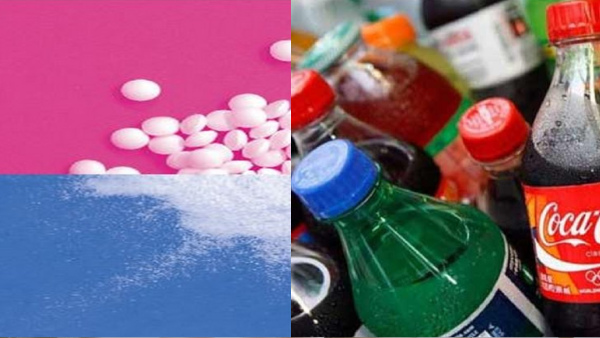Aspartame Sweetener, Used In Soft Drinks May Cause Cancer, But Safe Within Limits: WHO
International
oi-Deepika S

The World Health Organization on Thursday declared aspartame, an artificial sweetener widely used in diet drinks and low-sugar foods, could possibly cause cancer.
However, consuming a couple of aspartame tablets in coffee and tea is unlikely to be harmful.
Amid growing concerns about rising global rates of obesity, the International Agency for Research on Cancer (IARC) and the World Health Organization (WHO) and the Food and Agriculture Organization (FAO) Joint Expert Committee on Food Additives (JECFA) released the assessments of the aspartame.
The IARC has identified a possible link between aspartame and a type of liver cancer called hepatocellular carcinoma after a detailed study on artificially sweetened beverages.
What is Aspartame?
Aspartame is an artificial (chemical) sweetener widely used in various food and beverage products since the 1980s, including diet drinks, chewing gum, gelatin, ice cream, dairy products such as yogurt, breakfast cereal, toothpaste and medications such as cough drops and chewable vitamins.

“Cancer is one of the leading causes of death globally. Every year, 1 in 6 people die from cancer. Science is continuously expanding to assess the possible initiating or facilitating factors of cancer, in the hope of reducing these numbers and the human toll,” said Dr Francesco Branca, Director of the Department of Nutrition and Food Safety, WHO.
“The assessments of aspartame have indicated that, while safety is not a major concern at the doses which are commonly used, potential effects have been described that need to be investigated by more and better studies,” he added.
 What is Aspartame? 6 Things To Know About The Sweetener That May Pose Cancer Risk
What is Aspartame? 6 Things To Know About The Sweetener That May Pose Cancer Risk
IARC classified aspartame as possibly carcinogenic to humans (Group 2B) on the basis of limited evidence for cancer in humans (specifically, for hepatocellular carcinoma, which is a type of liver cancer). There was also limited evidence for cancer in experimental animals and limited evidence related to the possible mechanisms for causing cancer.
How much Aspartame is good?
JECFA concluded that the data evaluated indicated no sufficient reason to change the previously established acceptable daily intake (ADI) of 0-40 mg/kg body weight for aspartame. The committee, therefore, reaffirmed that it is safe for a person to consume within this limit per day.
For example, with a can of diet soft drink containing 200 or 300 mg of aspartame, an adult weighing 70kg would need to consume more than 9-14 cans per day to exceed the acceptable daily intake, assuming no other intake from other food sources.
An adult weighing 70 kilograms or 154 pounds would have to drink more than nine to 14 cans of aspartame-containing soda such as Diet Coke daily to exceed the limit and potentially face health risks, said Dr. Francesco Branca, who heads the WHO nutrition and food safety division, during the press conference Wednesday.
Branca cautioned that children who consume soda sweetened with aspartame could exceed the daily limit by drinking just three cans. He said children who start consuming aspartame early in life may face a heightened health risk later, though more research is needed on lifelong exposure.
“You may have families that instead of having water on the table, have a big can of sparkling drinks with sweeteners. That’s not a good practice,” he said.
 Rs 2000 for two doses: Cervical cancer vaccine Ceravac price in India
Rs 2000 for two doses: Cervical cancer vaccine Ceravac price in India
Widely used sugar substitute
The food industry widely uses aspartame as a substitute for sugar because it is 200 times sweeter than sugar, which means it can be used in low concentrations with very few calories and achieve a similar taste.
About 6,000 products worldwide contain aspartame, according to the Calorie Control Council, a trade group that represents the manufacturers of artificial sweeteners.
For all the latest World News Click Here
For the latest news and updates, follow us on Google News.


